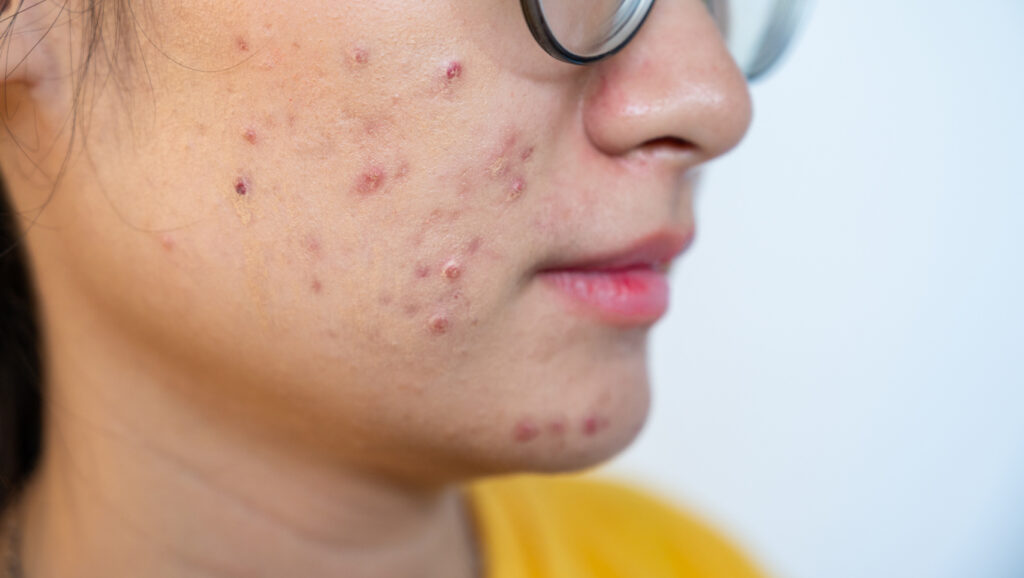Several months ago, reports from the independent laboratory Valisure suggested that common benzoyl peroxide (BPO) products may contain concerning levels of benzene, a known carcinogen, after incubation for days to weeks at temperatures of 37°C (99°F) and 50°C (122°F).
Now, two new reassuring studies show that BPO exposure in patients with acne is not associated with an increased risk of cancer or increased blood benzene levels.
Both studies are published in the Journal of the American Academy of Dermatology.
For the first study, Garate et al tapped into the TriNetX US Collaborative Network of 63 healthcare organizations to evaluate whether BPO use for acne is associated with the risk of hematologic or internal malignancies. They identified acne patients aged 12 to 40 treated with prescribed BPO using ICD-10-CM codes for acne. They compared cancer risk to a control cohort of patients diagnosed with either nevus (ICD-10-CM: D22) or seborrheic keratosis (SK) who had no exposure to prescribed BPO or a diagnosis of acne, hidradenitis suppurativa, or rosacea. They also conducted a sensitivity analysis using a comparator cohort diagnosed with viral warts to capture a younger population and improve sample size.
The main takeaway? Acne patients treated with BPO had no significant difference in risk of lymphoma, leukemia, any lymphoma or leukemia, and internal malignancy when compared to patients diagnosed with nevus or SKs.
“Although further studies are needed to replicate these findings and for generalizability, our study supports the safety of standard-of-care use of benzoyl peroxide for acne and is reassuring for those considering this treatment option,” study authors conclude.
Potential limitations include the potential for misclassification of BPO exposure due to OTC availability, imprecision, inability to evaluate dose-response relationships, and lack of detailed information regarding BPO storage conditions, the study authors note.
In the second report by Sadr et al, researchers evaluated blood benzene levels in 14 adolescents and adults who had used BPO products and 65 age-matched controls who did not use BPO products using data from the National Health and Nutrition Examination Survey (NHANES).
They found detectable blood benzene in five patients who had used BPO and 21 of their counterparts in the control group. The mean level of benzene was 0.04 ng/mL in the BPO users group and 0.05 ng/mL in the control arm.
Bottom line? There was no association between benzoyl peroxide exposure and detectable blood benzene levels or absolute blood benzene levels in this study.
“These results provide reassurance that standard-of-care benzoyl peroxide use might not be associated with incremental risk of benzene exposure,” the researchers conclude. “However, these findings do not eliminate the need to take measures to reduce the risk of thermal degradation of benzoyl peroxide products into benzene. “
Experts React to Reassuring News on BPO
Valisure petitioned the U.S. Food and Drug Administration (FDA) to recall acne products with benzoyl peroxide due to extremely high levels benzene, and the FDA is currently reviewing the information.
It’s still all eyes on the FDA, says James Q Del Rosso, DO, the Research Director of JDR Dermatology Research in Las Vegas, NV, and the Senior Vice President of Clinical Research and Strategic Development at Advanced Dermatology & Cosmetic Surgery in Maitland, FL.
The federal watchdog group is charged with approving and regulating BPO over-the-counter (OTC) and prescription products. “At the present time, and until we are informed otherwise by the FDA, BPO is currently designated as effective, safe, and approved for the treatment of acne in OTC cleansers, leave-on products, and Rx products for acne, and even one for rosacea,” he says.
If, when, or how the FDA will revise this statement is unknown at the present time. The benzene in Valisure’s testing was found when the products broke down in heat. “We don’t want benzene in any manufactured product, but we don’t know if the FDA requested that companies show that BPO wasn’t broken down to benzene after a stability test,” Dr. Del Rosso explains.
“It’s nice to have reassuring data by Garate et al. and Sadre et al. on blood levels and malignancy risk,” he says. “The new studies give us the sense that this may all be OK, but it is not the definitive answer as that lies with the FDA.”
For now, apply common sense practices when using these products as far as storage. “Keep them out of the heat and at room temperature or in a refrigerator if you can,” he says. “Make sure you read the label and follow the instructions on how long to keep it around before you discard it.”
Other experts agree that the new findings are reassuring.
“These two papers increase my comfort level with the continued use of BPO,” says Hilary Baldwin, MD, the Medical Director of the Acne Treatment & Research Center in Morristown, NJ,
“The [Sadr et al.] paper shows that benzene blood levels were no higher in acne patients using BPO than controls without acne/BPO use,” Dr. Baldwin tells TDD. “The numbers were small, duration and extent of use unknown, and there are some other confounders that I would have liked to see, but it is certainly a great start.”
Garate et al, “takes the next step and looking at data comparing more than 27,000 Acne/BPO to 27,000 non-BPO patients and finds no increased risk of lymphoma, leukemia or internal malignancies,” Dr. Baldwin says. “Follow-up time is low at about 7 years, but once again increases my comfort level. “
Emmy M. Graber, MD, MBA, the Founder of the Dermatology Institute of Boston, adds, “These studies, give us further confidence for our safe use of benzyl peroxide,” she says. “Benzyl peroxide is so critical in the port in the treatment of acne. It is one of the few agents that can rapidly improve acne, and in this era of antibiotic stewardship, it can help prevent resistance.”


